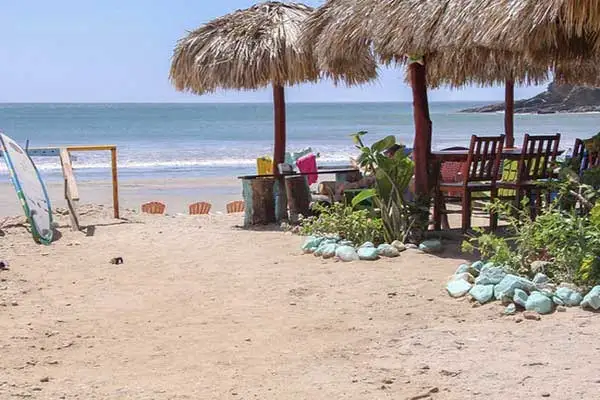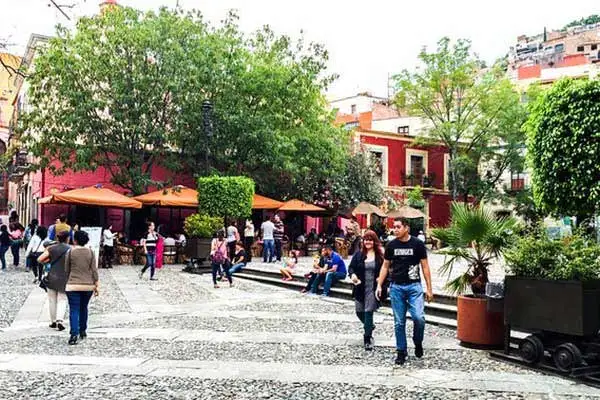At International Living, we’ve been tracking trends in retirement for four decades. A lot has changed. Forty years ago, retirement abroad looked much the same as retirement at home. Maybe it was more affordable overseas, healthier, and with better weather, but the concept was almost identical—a fallow period spent winding down after a working life that took its toll on body and spirit. The reward for decades spent dutifully chasing the American Dream.
These days, the outlook is much more life-affirming. We’re living longer, staying healthier, and remaining more active into old age than our parents’ generation could ever have hoped for. And we’re directing that extra vigor and time into lifestyles that truly mirror our interests. We’re pursuing new goals, developing our existing skills, and making retirement a time to flourish. For some, that simply means seeking out a tranquil spot in which to relax and recharge. For others, it involves re-inventing themselves in thriving cities, or re-tooling their life skills as a way to fund a life spent exploring the globe. Read on for the stories of retirees across the world for whom retirement isn’t a winding-down, but more like the first day of summer vacation…every day.
Trend 1: Multi-Generational Expat Living

Three Generations, Together in Mexico
By Ann Kuffner
In June of 2018 Linda, 65, and John Norman, 72, moved from Athens, Georgia, to San Miguel de Allende, Mexico. “We sold everything and moved with only three suitcases,” says Linda.
“We love the Mexican culture and pace of life. We love the lower cost of living. We like the weather, not needing a car, and that something interesting is always happening.
“Each morning we enjoy coffee and breakfast on our terrace, and a bit of quiet time. Then we head out. We might attend a yoga or photography class. Then we walk to our errands—getting the mail, grocery shopping, and meeting friends for coffee.”
Soon after the Normans moved to San Miguel, a colonial city with UNESCO World Heritage status, their daughter Corrinne Gilbertson, 40, and her family came to visit. Scott Gilbertson, 44, is a freelance writer for technology publications, and Corrinne teaches English online to children in China. Having online careers enables them to live and work wherever there’s a decent internet connection. “We came to visit my parents for six months,” says Corrinne. “We enjoyed it so much that we decided to stay. We returned to Athens to sell our house and belongings.”
Both families soon found a comfortable balance. “Several times a week we get together with our kids and grandkids,” says Linda. “They live close by, so they often drop by on their way to town. Sometimes John and I are in the town square. All of a sudden, we hear our grandkids scream ‘Gmommy and Gdaddy!’ as they come running up. We love these spontaneous encounters.”
Linda relishes seeing her grandkids absorb Mexican culture. “They were a bit intimidated at first. But now they’re confident walking around town. We love going with them to the many cultural parades and events that San Miguel has to offer. Together, we are observing and experiencing the beautiful rituals of the Mexican people.
“It’s a gift that we wouldn’t be able to share if we didn’t all live here. And, it’s really fun. Our grandkids have made friends here—both expat and Mexican. They really don’t see the differences in people that we adults see. Corrinne home schools them, but they also take gymnastic classes and are active at the Unitarian Church.”
Now that Corrinne’s family has comfortably transitioned, the Normans have the best of both worlds. “John and I were both so busy before we retired. Now we can spend plenty of quality time together. We explore the city and places close by. We volunteer at church. I take yoga classes. John enjoys his photography. We have a fulfilling family life, and social life.” Who could ask for more?
Three Generations, Together in Thailand
By Rachel Devlin

A phone call I received over a decade ago stopped me in my tracks. My mother, Pam, was in Thailand, and she was demanding that I help her transfer more than $20,000 for a down payment on a property.
She was on an extended vacation in Thailand when she realized that it was possible to retire in the country and live an exciting life. She bought a condo, renovated it, and decided to spend part of the year in the city of Chiang Mai.
I could see my mother absolutely maximizing her life in this vibrant Thai city. She was busy with expats at Ladies’ Lunches and singing in a choir, as well as taking various community courses. I was so happy for her to find this new life as a single person after her husband passed away.
In fact, her enthusiasm was infectious. Watching her living such a wonderful and fulfilling life, I was encouraged to sell up, retire early on a modest income, and move my own family to Thailand. I even moved our cat to the new family home.
My husband, Mick, and I decided to live around the corner from my mom. My son, who attends an international school nearby, is now on call if the fridge needs shifting or the dog needs an extra walk. Mom was always there for my son when I was busy working, and I am so happy that he can be there for her now.
Because I was able to find a way to retire early, I can enjoy more time with my mom. We often go out for extravagant Thai lunches, enjoying the spice, crunch, and fresh flavors that typify the local cuisine. A few years ago, she decided that she was finished with cooking at home. So I often cook Western-type meals like spaghetti or meatloaf that she can have on call in her freezer. We jokingly call them emergency packages.
I would never have had this time with my mother if I hadn’t moved overseas to retire early. I would have been too caught up in the whirlwind of work, domestic chores, and more work. That initial investment that mom made indirectly gave me a life of freedom and time with my family. And let’s face it, that is priceless.
Become a Digital Nomad
Many of the people in this article supplement their incomes with remote work which they can do from the comfort of their overseas homes or on the road. They’re digital nomads, whose “office” consists of a laptop computer and an internet connection.
Scott Gilbertson in San Miguel de Allende writes for technology publications; his wife Corrinne teaches English to children in China over the internet. They’re typical of a new approach to working life which dispenses with tiring commutes, office politics, dress codes, and workplace hassles. Scott and Corrinne found a way to leverage their life skills into a method of funding an international lifestyle at a pace they choose.
Bonnie W. Hayman, who describes her life in Nicaragua, and Kirsten Raccuia, who sings the praises of New Urban living in Malaysia, are also living their dream lives overseas while working remotely. The benefits are multiple, and in many countries, include tax exemptions on income earned from outside your country of residence.
Trend 2: Roving Retirement

The Best of All Worlds
By Todd Hilton
When my husband, Damon, and I started our roving retiree lifestyle, our friends and family thought we had lost our minds. We sold everything we owned: the cars, the house, even the silverware. We packed two backpacks each, bought one-way tickets to Costa Rica, and didn’t look back. That was February of 2016, and we haven’t stopped yet.
For us, being roving retirees is definitely a lifestyle choice. We enjoy being in different locations for one to three months at a time. We started in Central America, moved through South America, and we’re currently traveling through Indonesia and Southeast Asia. We usually plan our next location a couple of months in advance, which helps bring the cost down when you’re purchasing airline tickets.
We mostly base our locations on a few necessities. Are there cultural activities nearby? Are there shops, restaurants, and coffee shops within walking distance? Is the WiFi decent? Are the neighborhoods safe? Is there an established expat community already?
People always ask us about healthcare while we travel. When Damon retired from the State of California as a corrections officer, he received a full medical coverage package. I’m added to that policy as a spouse for an additional $70 a month, and we are fully covered during any travel outside of the country.
Modern technology has really helped to keep us connected with friends and family. It’s always amazing to me that we can make video calls to people back home, and it doesn’t cost a penny.
While we travel, we always keep our eyes and minds open to possible retirement locations. Eventually we will need to put down roots once again. And we have decided that living somewhere abroad will be our best choice, financially. Our retirement incomes go so much further than they do back home in the U.S.
But until that time, there’s a big ol’ world out there, and we haven’t finished seeing it.
Trend 3: The New Urbanite

Getting Back to the Heart of the City
By Kirsten Raccuia
Moving abroad offers you a chance to redesign your lifestyle. Why not move to a fresh new city and be in the heart of it all? You’ll no longer need a big home to care for or a garden to tend; so downsize and make your life easier.
When Chele Cassebohm and her husband, David, moved to Penang, Malaysia, they went from owning a large home with a yard to a condo right beside the city. “Before, we had to plan for everything. We couldn’t just lock up the home and travel; who would take care of the dog, get the mail, water the garden? Having a condo gives us the freedom to get up and go.”
Think of how many hours you spend driving…living in the city means you won’t even need a car. But if you do need to get somewhere, there is always public transportation or taxis.
“We live right in the center of downtown Kuala Lumpur, and we walk everywhere. We’re healthier for it. In Houston, we had to get in a car to do anything,” says Sharla Thomason of her Malaysian retirement with her husband, Jim. “And we don’t cook as much, because living in the thick of it all means you can walk out your door and be at a dizzying array of restaurants. Eating out is so much cheaper here.”
Bars, restaurants, concerts, theater, galleries, parties. They were always there, right in the city. But for most of us, life got in the way. In the sophisticated, lowcost urban retirement hubs International Living covers every month (think Cuenca, Ecuador, or Phnom Penh, Cambodia, or Lisbon, Portugal…and more) you don’t have to drive into the city for a night on the town…you just walk out your door.

From Small-Town Living to the Big City in Colombia
By Nancy Kiernan
I lived in a small town of 10,000 residents for 27 years before I retired in 2012 to cosmopolitan Medellín, Colombia. Since I was used to suburban life, I wasn’t sure I would be able to adjust to living in a city of 3 million people.
I soon learned to love my urban retirement, though. I have quick and easy access to everything the city has to offer, including shopping malls, theaters, movies, museums, the symphony, dance clubs, and sporting events.
Instead of a large home that requires maintenance, upkeep, and dedicating most weekends to yard work or some other home project, I now have a lovely three-bedroom apartment in a gated community. It is large enough to have room for visitors, but small enough that it is easy to take care of, so I have lots of free time.
Having a condo gives us the freedom to get up and go.
My monthly association fee ($150) covers all building maintenance, gardening, pool upkeep, and 24-hour security. So, if I want to travel, I can just throw the breakers and “lock and leave” for as long as I want without worrying who is going to look after the place.
Being in the center of things in Medellín certainly has its advantages. When I lived in the suburbs in the U.S., I ate out once every couple of weeks. Mostly because I didn’t want to get in the car and drive to a restaurant, but also because it was expensive. Now, I can walk to more than 100 restaurants and pay about one-third the price. So, the huge kitchen with storage for every conceivable appliance and gadget is a thing of the past.
The public transportation system in Medellín is first-rate. I can get anywhere I want by bus, the metro and taxi/Uber.
Better yet, I walk as much as possible. Not only is it free and great exercise, but I get to see the city up close and personal.
Trend 4: A Solo Retirement

Often Alone, but Never Lonely
By Bonnie W. Hayman
I’m not going to lie to you. Moving abroad alone can be a little scary. But the end result is so much better than you ever imagined. That’s how it played out for me when I made a sudden decision to move to Nicaragua.
On the last night of the best vacation I’d ever had, watching a glorious sunset with an ice-cold beer in hand, something snapped. I bought a house in San Juan del Sur the next day, went back to the States, closed my technical writing business, got my San Diego house ready to rent, and was back living full-time in Nicaragua 90 days later.
Now, almost 12 years later, I can say it was the best decision of my life.
One of the biggest worries when you compare retiring at home solo to retiring abroad solo comes down to friendships. At home you surround yourself with family and friends…familiar faces that keep you insulated, cared for, and fine. When moving abroad, you are forced to seek new buddies, people you can talk with, invite over for dinner, possibly have as travel companions.
Personally, I think it is easier for singles to make friends than couples when you live abroad. Mostly because two people must both like the friends they are making. When you are alone, it’s just your decision. There are expat hangouts everywhere. Just walk right in and ask someone a question to start a conversation.
In my case, I made friends from all over the world. Every year when I give my traditional U.S. Thanksgiving dinner for 40 people, friends from Nicaragua, South Africa, Australia, Canada, Italy, Germany, and more arrive to experience my happy day. I would never have had so many delightful international friends if I had stayed in the U.S.
Another crazy thing when you move abroad solo: you don’t feel lonely. It’s hard to explain. In San Diego, if I didn’t have plans on the weekend and I had to sit home on a Friday or Saturday night alone, I did feel lonely. But not here. Often, I’m happy just to be in my cute little oceanview cottage by myself. I can paint, watch four episodes of a Netflix show straight through, settle down with a glass of wine and a good book, etc. I never feel obligated to do anything here.
Another terrific thing about moving abroad solo is that I can be the me that I always wanted to be. Back home, I knew so many judgmental people who always stopped me from saying what I really wanted to say just with their presence. People who looked at me funny if I wore certain clothes. So, I adjusted. I was not quite “me.” But a single person living in a foreign country can be anyone he or she wants to be, and no one cares.
This feeling of being carefree, with no one to answer to, takes me back to a time in my young adulthood. It makes me feel independent. Free. Happy. And isn’t that what it is all about?
Don’t be scared about how you will manage, how you will accomplish things. Especially if you are a woman alone, people will bend over backward to help you. If you learn the language, you will also have local friends and usually they help you the most. If you want to move to another country solo, I can’t think of one reason why you shouldn’t. In fact, if it’s anything like my experience, it will probably be the most exciting and happiest time of your life.
Trend 5: Best of Both Worlds With Part-Time Living

Is the Part-Time Expat Life for You?
By Louisa Rogers
“Isn’t it complicated having two homes?” a friend asks. My husband, Barry, and I share two very different lives: one in an apartment we rent in Eureka, on California’s North Coast, and the other in a home we own in the colonial city of Guanajuato, in central Mexico. Probably the biggest advantage is the variety and stimulation each environment offers. For example, I enjoy living by a bay in California, where I paddleboard. But we also love hiking right from our front door in Guanajuato, which we certainly can’t do from our apartment in Eureka.
Expenses can add up when you maintain two homes, like the flights back and forth. But we offset the cost by renting our Guanajuato home when we’re away.
Another advantage of being part-time is that when we’re not in Mexico, we make our house available on a home-exchange website. I’m typing this article in Medellín, Colombia, where we’re staying in the home of a couple who found us on Homeexchange.com.
We try to manage our healthcare needs when we’re in the U.S. On the other hand, we take advantage of the ad hoc medical care which is more affordable abroad. A few years ago, I had cataract surgery in Mexico for $500, and Barry just had a root canal performed in Medellín for only $200.
The mental shifts required are trickier than the logistics. I’ve learned that I’m the one who has to take the initiative with friends; I can’t expect them to keep up with my crazy schedule. But I haven’t lost any friends due to my itinerant lifestyle. In both towns, our friends (and even the clients of my communications training business) seem to accept our rhythms.
Which lifestyle would work for you? If you prefer consistency and rootedness, you’d probably be happier moving somewhere full-time. But if you like variety, stimulation, and change, the part-time expat lifestyle might be just the answer.
Cut Your Costs By Petsitting
For most, a vacation in the Grenadine Islands is an expensive affair, but petsitters stay for free.
“Right now, my husband, Doug, and I are living rent-free in a four-bedroom luxury villa in the Grenadine Islands overlooking the Caribbean,” says Johanne Sauve, 59, of Vancouver, Canada. “Our days are spent mostly lounging around the infinity saltwater pool, making sure the pets get everything they need. A small price to pay for such a great lifestyle.”
In Atenas, a village in the mountains of Costa Rica’s Central Valley, Jodie Cook also offers her time and expertise to homeowners needing some backup for when they’re out of town. “The animals are the upside,” says Jodie. “When you stay at someone’s house, they put their trust in you; and it’s a good feeling to know you can help them by taking care of their pets and home.”
Many services help connect homeowners with petsitters. Good ones to start with are Trustedhousesitters.com, and Housecarers.com.
To get started with petsitting, you’ll need to create a personal profile on these sites, which displays that you’re experienced in caring for animals, and that you’ll be able to cope with any minor emergencies that take place when you’re caring for someone else’s pets and property.
Those are pretty basic life skills for prospective retirees, and petsitting is an activity that values both your age and your experience. After all, who would you choose to look after your home and pets when you were away—a baby boomer or a college student?
